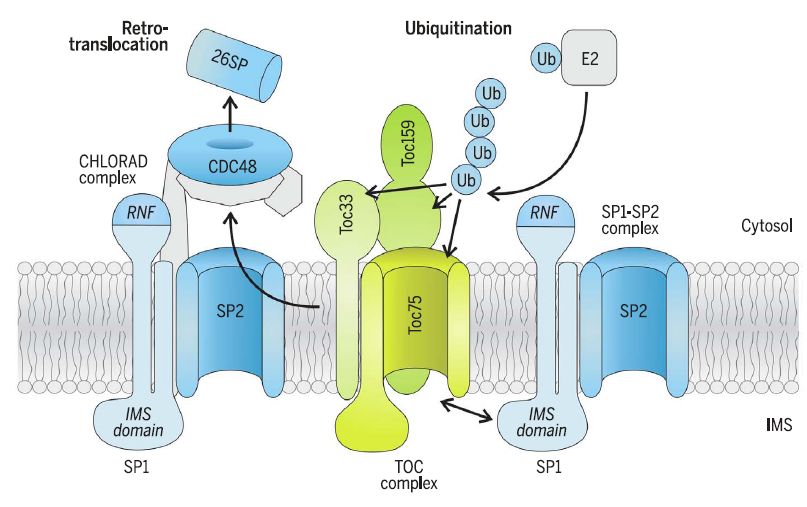Chloroplasts are important organelles that provide a source of energy for plants. The turnover of the internal chloroplast proteins is regulated by protease of the prokaryote type, while the outer membrane protein is degraded by the E3 ligase SP1 mediated ubiquitin-proteasome system in the chloroplast for response to developmental and environmental signals. However, the mechanism for this is still unclear. On February 22, 2019, Science published "Ubiquitin-dependent chloroplast-associated protein degradation in plants" from the team of Professor Paul Jarvis of the University of Oxford, UK. They discovered a new chloroplast protein degradation responsible for the degradation of outer membrane proteins. System - CHLORAD (chloroplast-associated protein degradation). Ubiquitin-dependent chloroplast-associated protein degradation in plants Science. 2019 Feb 22; 363 (6429). IF=41.058 Paper link: Https://science.sciencemag.org/content/363/6429/eaav4467 Using forward genetics screening and proteomic analysis, the researchers identified two important components (SP2 and CDC48) that work together and are responsible for the reverse transport of the substrate so that the substrate is degraded by the proteasome in the cytosol. Specifically (Figure 1), the SP1 E3 ligase directs ubiquitination (Ub) of the target protein. The SP2 and CDC48 protein intermediates are targeted for reverse transport to the cytosol, providing conduit and driving force for the process, respectively. Upon release into the cytosol, the target protein is degraded by the 26S proteasome (26SP). Figure 1. Schematic representation of ubiquitination-dependent degradation of chloroplast-associated proteins This is the first reported biochemical pathway for the systematic export of individual proteins from chloroplasts, and is different from the previously reported protein transport process (transport from cytoplasm to chloroplast), which is reversed. In addition, the researchers found that by manipulating the CHLORAD pathway, plants can be altered to tolerance, suggesting that CHLORAD is involved in the regulation of plant stress. Therefore, the results of this study can provide a new theoretical basis for improving the stress resistance of crops, which is of great significance. Small editor In recent years, more and more research in the field of plant stress resistance has used the omics technology as a breakthrough to discover new regulatory mechanisms. For example, in the process of searching for the components of the TOC complex, we have used proteomics. Technology . In addition, this mechanism study also fully illustrates the important role of ubiquitination-proteasome degradation in plant stress resistance, and the use of modified omics to conduct plant stress resistance studies is also a "bright spot". Please refer to: [Modification column] Latest report on post-translational modification group in plant stress research Talk about classics again - Nature Genetics: ubiquitination modification and stress APTBIO modified proteome • Based on the domestic top proteomic service platform, the industry is the first to introduce modified omics analysis services; • The use of gold-labeled antibody enrichment, the antibody provider's preferred recommended omics service platform; • Cooperative article published: Domestic lead + number leading phosphorylation, ubiquitination group representative article APTBIO proteome • International HLPP, HPPP Human Proteome Project participants, accumulated over 15 years of experience; • Strict quality control system to provide reliable data. APTBIO Quality Control System • Zhongke New Life adopts a strict standard quality control system. A number of evaluation contents comprehensively and objectively monitor the system stability of the instrument and evaluate the quality of the data. APTBIO Lab Qualification Advantage • Zhongke New Life has a strict experimental management system, and through CMA certification, ISO9001 quality management system certification, inter-room quality assessment, is a reliable partner on your research road. Product categories Ultrasonic Plastic Welder ,We provide free sample service, 24-hour online professional ultrasonic solutions, contact us immediately. Look forward to your cooperation! Ultrasonic Plastic Welder,Ultrasonic Plastic Welding Machine,20K Ultrasonic Welder,Ultrasonic Welder Wuxi DIZO Ultrasonic Technology Company , https://www.dizosonic.com

 In order to cope with the frequent adverse stress caused by global climate change, it is of great significance to comprehensively and clearly understand the different regulatory mechanisms of plants in the face of stress response. In plant stress resistance studies, it was found that abiotic stress inhibits plant photosynthesis, affects the stability of chloroplasts and induces chloroplast degradation. Chloroplast degradation can lead to premature senescence and ultimately affect crop yield.